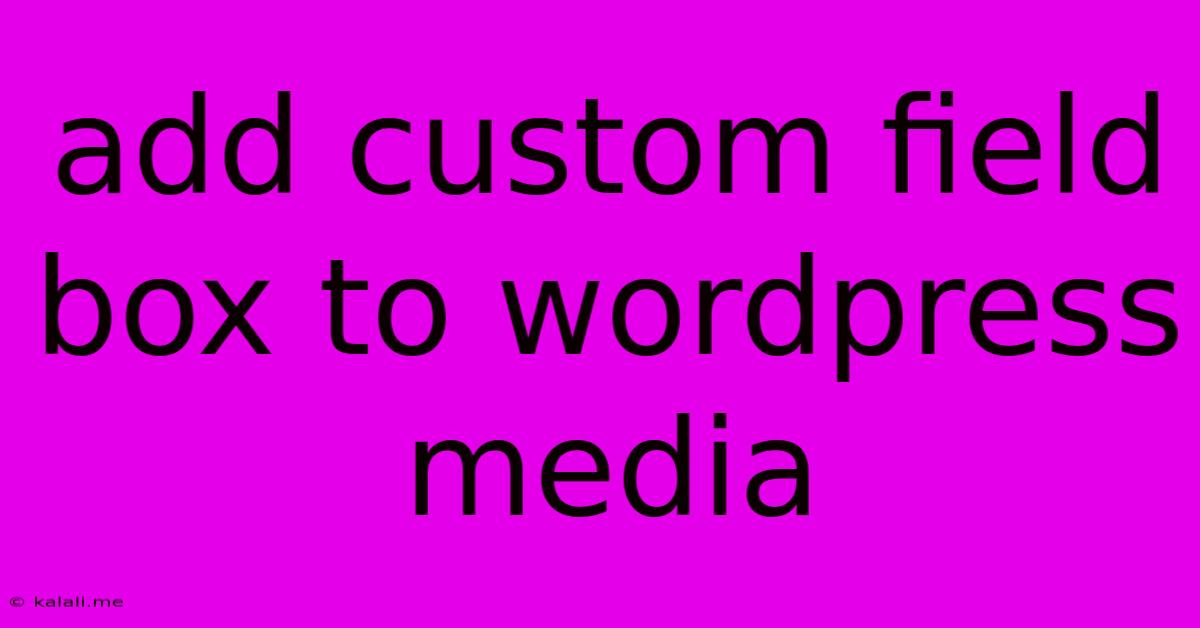Add Custom Field Box To Wordpress Media
Kalali
Jun 02, 2025 · 3 min read

Table of Contents
Adding Custom Fields to Your WordPress Media Library: A Comprehensive Guide
Want to add extra information to your WordPress media files beyond the standard title, caption, alt text, and description? Adding custom fields to your WordPress media library allows you to organize and manage your assets more efficiently. This comprehensive guide will walk you through the process, explaining how to add custom fields and leverage their power for improved workflow and metadata management. This will enhance your content organization and potentially improve your SEO.
This guide is perfect for photographers, designers, bloggers, and anyone who frequently uploads media to WordPress and needs a more robust way to manage it. We'll explore both plugin and code-based solutions.
Why Use Custom Fields for WordPress Media?
Standard WordPress media fields are useful, but often insufficient. Custom fields allow you to:
- Add specific metadata: Track copyright information, model releases, location data, client names, or any other relevant information directly linked to your media files.
- Improve organization: Easily filter and search your media library based on your custom fields. This is especially helpful for large libraries.
- Enhance workflow: Streamline your editing and asset management process.
- Boost SEO: While not a direct ranking factor, meticulously tagged media improves content quality signals indirectly contributing to better SEO.
Methods for Adding Custom Fields
There are two primary ways to add custom fields to your WordPress media library: using a plugin or by adding custom code.
Method 1: Using a Plugin (Easier Method)
Several plugins offer easy-to-use interfaces for managing custom fields in the WordPress media library. While specific features and user interfaces may differ, they generally provide similar functionality. Researching and choosing a plugin that best fits your needs and workflow is crucial. Look for plugins with features like:
- Intuitive interface: Easy to use, even for beginners.
- Custom field types: Support for various field types (text, numbers, dropdowns, etc.).
- Bulk editing: Ability to edit multiple media files at once.
- Search and filtering: Easily find media based on custom field values.
Once you've chosen and installed a suitable plugin, follow its specific instructions for adding and configuring your custom fields. Most plugins will provide clear documentation and step-by-step guides.
Method 2: Using Custom Code (Advanced Method)
This method requires familiarity with PHP and WordPress functions. It involves adding code to your theme's functions.php file or a custom plugin. This approach offers greater control but requires more technical expertise.
Here's a basic example of adding a custom field named "copyright" using code:
function add_custom_media_fields( $form_fields, $post ) {
$form_fields['copyright'] = array(
'label' => 'Copyright Information',
'input' => 'text',
);
return $form_fields;
}
add_filter( 'attachment_fields_to_edit', 'add_custom_media_fields', 10, 2 );
function save_custom_media_fields( $post_id ) {
if ( isset( $_POST['attachments'] ) ) {
foreach ( $_POST['attachments'] as $attachment_id => $attachment_data ) {
if ( isset( $attachment_data['copyright'] ) ) {
update_post_meta( $attachment_id, 'copyright', sanitize_text_field( $attachment_data['copyright'] ) );
}
}
}
}
add_action( 'save_post', 'save_custom_media_fields' );
This code adds a text field labeled "Copyright Information." Remember to replace "copyright" with your desired field name. This is a simplified example and might need adjustments based on your specific requirements. Always back up your files before making code changes.
Managing and Utilizing Your Custom Fields
Once your custom fields are added, use them consistently. This ensures the value of your improved media management. Remember to:
- Use descriptive field names: Makes it easier to find and understand the data.
- Maintain data consistency: Use the same terminology and formatting across all your media files.
- Regularly review and update: Keep your metadata up-to-date for accuracy.
By implementing custom fields, you significantly enhance your WordPress media library, creating a more organized and efficient workflow. Whether you choose the plugin or code method, the benefits far outweigh the initial effort. Remember to always back up your website before implementing any code changes.
Latest Posts
Latest Posts
-
I M Playing Chess You Re Playing Checkers
Jun 04, 2025
-
Bike Chain Making Noise When Pedaling
Jun 04, 2025
-
What Does It Mean For Women To Be In Purdah
Jun 04, 2025
-
Does Native American Grow Facial Hair
Jun 04, 2025
-
I Need To Question Why You Did This
Jun 04, 2025
Related Post
Thank you for visiting our website which covers about Add Custom Field Box To Wordpress Media . We hope the information provided has been useful to you. Feel free to contact us if you have any questions or need further assistance. See you next time and don't miss to bookmark.